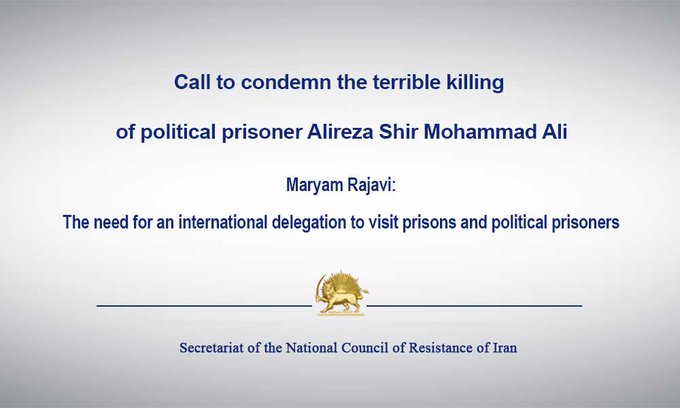Humanitarian conditions worsening in Iran’s prisons
Harsh condition of prisons in Iran
Iran, October 12, 2019—Reports coming from inside Iran pertain to mounting pressure against Iranian prisoners and worsening humanitarian and human rights conditions inside Iran's prisons. In recent months, the regime has resorted to various measures to cause fear in society and dissuade people from joining protests that are ongoing in different parts of Iran.
These measures coincide with the appointment of Ebrahim Raisi as the regime’s chief of the judiciary. Raisi was one of the key figures in the 1988 massacre of 30,000 political prisoners, most of them members and supporters of the prominent Iranian opposition movement the People’s Mojahedin Organization of Iran (PMOI/MEK).
The regime has effectively turned its prisons into centers for the torture and annihilation of prisoners.
The situation in Karaj Central Prison
One of the facilities where the conditions for prisoners have worsened is Karaj Central Prison. Every hall in the prison has the capacity for 200 people. But prison authorities have effectively packed 700 people in each hall. Due to lack of space and beds in cells, many of the prisoners are forced to sleep on the ground and on cardboards.
Prisoners with mental illness and contagious diseases such as hepatitis have been abandoned with no medical care, and they’re mixed with other prisoners, causing the spread of dangerous diseases among the population of the facility.
The Karaj Central Prison also has very poor sanitary conditions. Prisoners are faced with water shortages on a regular basis. Every day, from 2 pm to 6 pm, the facility’s water is cut off. According to reports, when prisoners protested the situation, the prison’s chief said, “You’re lucky that we haven’t cut off electricity.”
Prisoners are also required to pay for the soap and other hygiene products. This puts further pressure, who have no means to earn money and must rely on their families to pay for their expenses.
Food rations in Karaj Central Prison have diminished to a quarter of what they used to be. Even the bread has become smaller than before and the prisoners are always hungry. The prison has a local store, but it sells its goods at several times the real price. Prisoners must get money from their families to buy food from the store. But many of the prisoners who were faced with economic pressure before coming to prison don’t have the means to buy anything from the store.
The killing of political prisoner Alireza Shir-Mohammad-Ali while in detention was a premeditated criminal plan by the clerical regime which calls for attention of international community to the dire conditions of prisons and political prisoners in #Iran.
I reiterate the need for the formation of an international delegation to visit and inspect Iranian prisons and conditions of political prisoners in #Iran.maryam-rajavi.com/en/item/maryam…
311 people are talking about this
The prison authorities consider any protest that involves two or more people as a riot and suppress it brutally. If the prisoners persist in their protests to the poor conditions in the Karaj Central Prison, they face grim consequences that are set up to look like an “accident” in the clinic, a “suicide,” or a fight with other prisoners.
The prison chief and wardens have agents among prisoners, whom they use to suppress prisoners who do not abide by their brutal rules. These so-called agents violently assault any prisoner their bosses instruct them to. They use knives and sharp objects to attack and kill prisoners.
Prison authorities are also directly involved in the distribution of narcotics among prisoners.
One of the new measures authorities of Karaj Central Prison have implemented is the remote sentencing of prisoners. Instead of taking prisoners to court, prison authorities perform trials through video conferencing software. This way, prisoners have no access to their lawyers.
Pressure against inmates in Urmia Central Prison
The situation in other Iranian prisons isn’t any better. Recently, the prisoners of Urmia Central Prison protested to the canceling of meetings. The chief of the facility said that starting from Saturday, daily meetings for political prisoners will be canceled and replaced with weekly meetings. This regime authority claimed that the measure is meant to prevent the entrance of narcotics into Urmia Central Prison.
Political prisoners protested to this measure and threatened to go on strike. Fearing the situation spinning out of control, prison authorities backed down from their decisions and resumed meetings for prisoners.














No comments:
Post a Comment